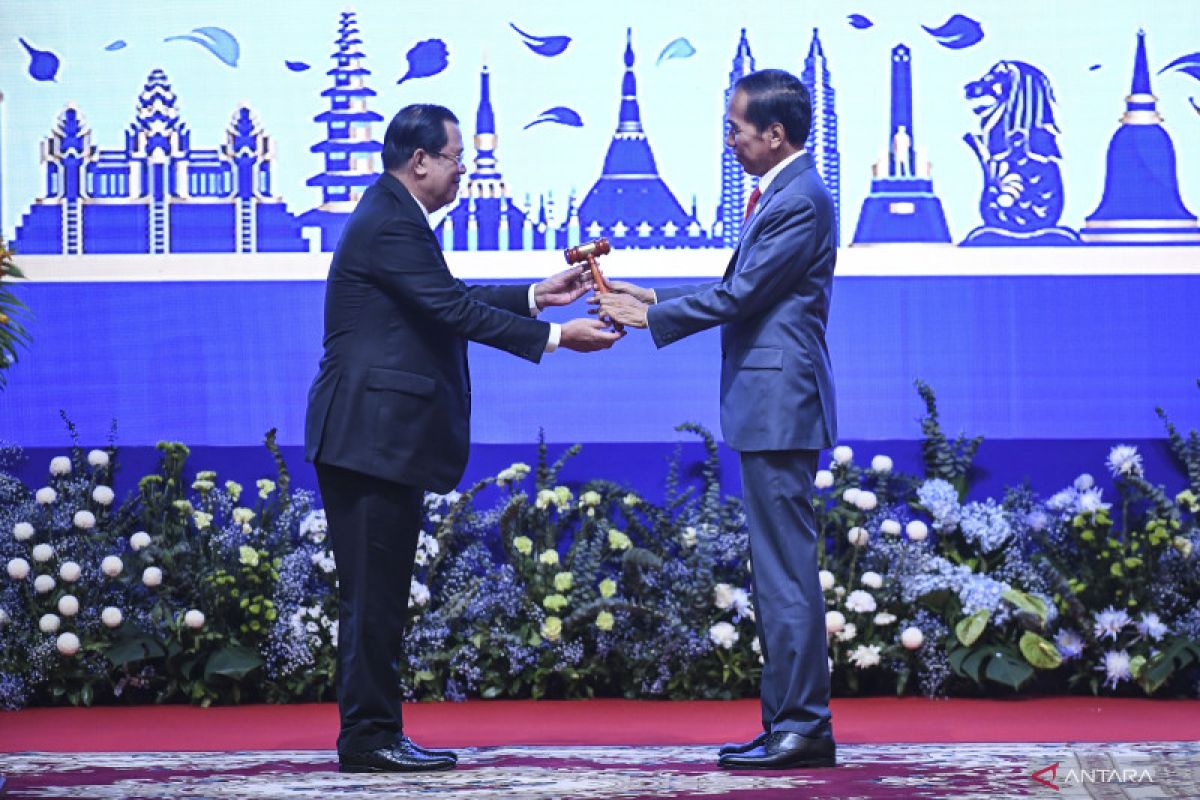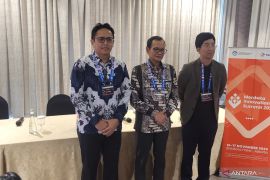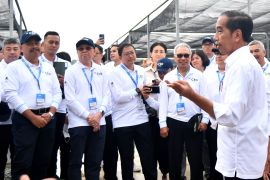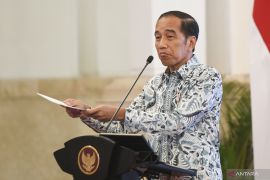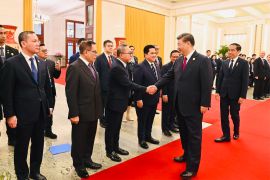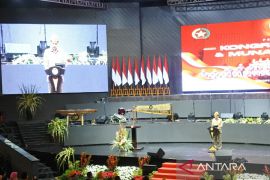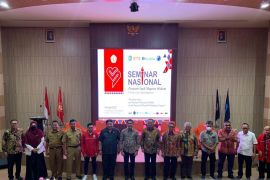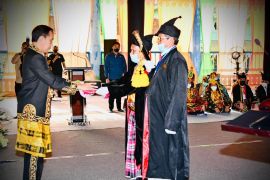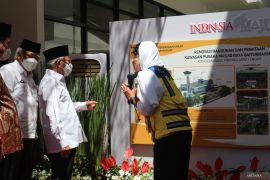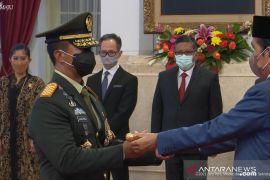The handover of the chairmanship took place at the closing ceremony of the 40th and 41st ASEAN Summits and other related summits at Phnom Penh, Cambodia, on Sunday (November 13, 2022).
The chairmanship of Indonesia will raise the theme of “ASEAN Matters: Epicentrum of Growth.”
Through the theme, it is expected that ASEAN will become a stable and peaceful region -- an anchor for global stability.
ASEAN will also uphold international law, humanitarian values, and democratic practices, and will not act as a proxy for any party.
Furthermore, Widodo said he hoped that ASEAN would become a fast-growing, inclusive, and sustainable economic region, in accordance with the spirit of mutual cooperation and the implementation of the ASEAN Charter.
Hence, the capacity building of ASEAN institutions must also be strengthened to enable them to answer various international challenges for the next 20 years.
The Indonesian President said he expects that by 2045, ASEAN will be more adaptive, responsive, and competitive
At the ceremony, he also invited ASEAN leaders to attend the 2023 Summit in Indonesia.
Prominent and relevant
According to Foreign Affairs Minister Retno Marsudi, Indonesia wants ASEAN to remain prominent and relevant in resolving various issues faced by its people as well as the Indo-Pacific region and the world.
Regarding the logo of Indonesia’s 2023 ASEAN chairmanship, which was revealed by Widodo at the handover ceremony, Marsudi said that it depicts the sky, mountain, sea, and earth, as well as the Maleo bird.
The sky symbolizes embracement and protection, he added. The mountains and the earth reflect solidity and stability.
In addition, the mountain is a symbol of optimistic growth to help all ASEAN members advance better, she explained.
Meanwhile, the ocean connects and unites all islands of countries in the region, she noted.
Furthermore, the Maleo bird represents Indonesia’s rich biodiversity as the bird is endemic to Sulawesi, she said.
Overall, the logo emphasizes dynamism, responsiveness, and adaptivity in addressing all global and regional challenges.
ASEAN has three pillars of cooperation, namely the political security pillar, the economic pillar, and the sociocultural pillar.
During Indonesia’s chairmanship, discussions on issues related to the political security pillar will be led by Coordinating Minister for Politics, Law, and Security Mahfud MD as well as Marsudi.
Discussions on the economic pillar will be coordinated by Coordinating Minister for Economic Affairs Airlangga Hartarto, and the sociocultural pillar by Coordinating Minister for Human Development and Culture Muhadjir Effendy.
Meanwhile, the general coordination with the ASEAN Secretariat will be carried out by the Foreign Affairs Ministry.
The first activity of Indonesia’s ASEAN chairmanship will be a foreign affairs ministerial meeting in January 2023. Most technical-level meetings will be held at the ASEAN Secretariat in Jakarta.
The new building at the secretariat currently has adequate meeting rooms, thus it would be suitable for holding ASEAN meetings.
So far, it has been estimated that more than 50 meetings will be held at the ASEAN Secretariat during Indonesia’s chairmanship next year.
Indonesia will also implement a number of flagship events during its chairmanship, including the Indo-Pacific Infrastructure Forum and the ASEAN Creative Economy Business Forum.
With good intentions and hard work, Indonesia's ASEAN chairmanship will hopefully benefit not only the Indonesian people, but also the people of ASEAN and the world—because ASEAN matters as an epicenter of growth.
Multidimensional challenges
Indonesia's ASEAN chairmanship, which will extend from January 1 to December 21, 2023, has come amid an uncertain global situation, which has brought multidimensional challenges.
Indonesia's chairmanship has come at a time when the global situation is not easy—from geopolitics to economy, the condition is still not conducive, Marsudi noted.
Further, the current geopolitical rivalries may remain sharp next year. ASEAN has expressed the hope that the rivalries will not trigger another conflict, especially in the Indo-Pacific and Southeast Asian regions.
Meanwhile, regarding the global economy, if countries do not immediately strengthen their cooperation to overcome the food and energy crises as well as tackle the scarcity of fertilizers, the fiscal capacity of developing countries, in particular, will weaken.
Then, the global economy will be even bleaker next year, the minister added.
She said that the ASEAN community should be grateful that in the midst of projections of a continued decline in the global economy, growth in the Southeast Asia region has been above the global average.
She recalled that Southeast Asia had been affected by a severe financial crisis earlier, however, the region had given a fairly strong economic performance since then.
She said that ASEAN’s economic growth has almost always been above the world average, for instance, the region’s economic growth in 2012 reached 6.2 percent, when global growth was recorded at 2.7 percent.
Furthermore, in 2015 and 2018, the region’s growth was 4.8 percent and 5.2 percent, respectively, better than the global economic growth of 3.1 percent and 3.3 percent, respectively.
Meanwhile, ASEAN's economic growth and global economic growth were recorded at 4.6 percent and 2.6 percent in 2019, respectively.
In addition, the region’s economic growth is projected to reach 5.1 percent in 2022, higher than the global growth of 3.2 percent.
The estimation is based on the performance of each ASEAN country in 2022, which has been quite good so far, Marsudi stated.
For instance, Indonesia posted an economic growth of 5.72 percent in the third quarter of 2022, an increase from 5.4 percent in the second quarter of the year, she noted.
Indonesia wants to maintain this positive trend to make Southeast Asia the epicenter of growth and maintain regional stability.
Related news: Jokowi supports payment connectivity in ASEAN to enter global level
Related news: President Jokowi pushes ASEAN-Canada concrete cooperation
Editor: Rahmad Nasution
Copyright © ANTARA 2022
